Cost of essential goods in Iran increases beyond government estimates
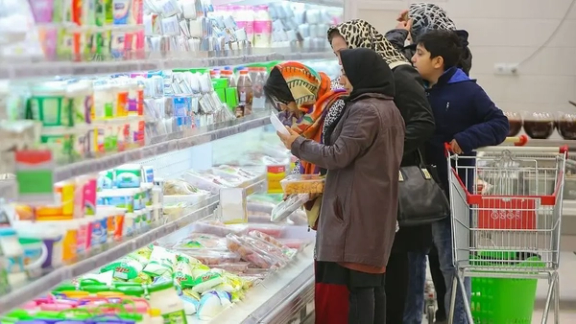
Prices of essential goods in Iran have increased sharply in recent months, with some food items more than doubling, while official government statistics report only a 2% rise.

Prices of essential goods in Iran have increased sharply in recent months, with some food items more than doubling, while official government statistics report only a 2% rise.
The Statistical Center of Iran recently reported only a 2% increase in the retail price of cooking oil since last year, whereas market data indicate it jumped by 15%. A similar discrepancy also lies in many other core commodities.
The latest government statistics were released in a report on Wednesday called Average Prices of Selected Food Items in Urban Areas - December 2024.
But analysis of 15 household items by Iran International reveals significant differences between market expectations and government statistics.
The price of My Baby diapers has doubled since September and increased by 140% from February 2024.
The report also shows that the price of imported rice increased by about 22% in December 2024 compared to the previous year.
Iran International also found out that a 10-kg bag of Pakistani rice, worth 6.5 million rials ($7.7) in February 2024, is now selling for about 17.5 million rials ($20.8), up almost 170%.
The same pattern appears in meat prices. Lamb has risen by 27% in the past year, according to the official statistics while the 2025 market prices show an 81% year-on-year rise.
Since 2018, when the US re-imposed economic sanctions under the maximum pressure policy, Iranian currency has dropped nearly 20-fold. In the last five months alone, the rial has lost a further 30% of its value.
On Thursday, every US dollar was exchanged for 840,000 rials in the market.
Over one third of Iranians are now living below the poverty line amid the worst economic crisis since the founding of the Islamic Republic.
Since the crisis kicked in back in 2022, it has led to many Iranians bartering for food items.
This week, in a bid to stabilize soaring potato prices, Iran is now importing 50,000 tons of potatoes, according to the country's deputy agricultural minister.
They will be sold at a target price of about 30 US cents per kilogram, less than half of the current market prices, Akbar Fat’hi said on Wednesday.
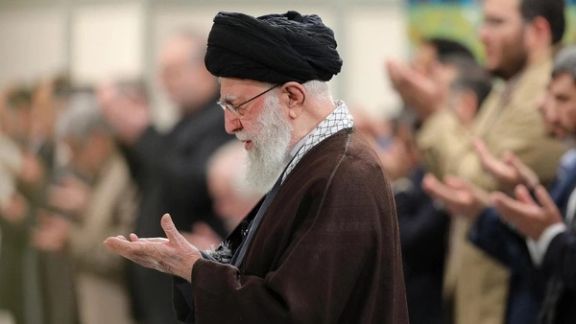
Iran’s Supreme Leader Ali Khamenei has hinted at and cautioned about potential negotiations with the United States, maintaining his long-held strategy of calculated ambiguity.
In a speech in Tehran on Tuesday, Khamenei warned Iran’s officialdom of Washington’s hidden agendas without dismissing talks entirely.
This is characteristic of his rule. He opposes US policies while keeping the door open for engagement under certain conditions. The aim is clear: to manage internal factions and external pressures without committing to a clear course of action
But would this work with President Donald Trump and his expected ramping up of economic and political pressure?
Khamenei’s approach appears rooted in what his supporters call strategic patience. But it may be better framed as noncommittal interference.
By neither fully rejecting nor embracing negotiations, he hedges his bets, leaving room to say “I told you so,” regardless of the outcome.
This approach has more often than not allowed the Islamic Republic to navigate geopolitical pressures while preserving its core interests. Khamenei's hope is to deter aggressive US policies and mitigate domestic instability without making significant concessions.
Iran’s response to Trump’s hard line
The Trump administration is expected to revive the maximum pressure campaign on Iran, aiming to force Tehran to negotiate under terms favorable to Washington. This stands in contrast to Joe Biden’s more moderate policy of non-aggravation.
Trump has explicitly said that his primary goal is to prevent Iran from developing nuclear weapons, citing the country’s short breakout time.
There are signs, however, that he might adopt a softer tone to encourage dialogue. The absence of US reports on Iran’s human rights violations at a UN Human Rights Council meeting last week could be a case in point.
That said, it seems unlikely that Trump would abandon his core strategy of cutting off Iran’s oil revenues, particularly by managing China’s demand for Iranian crude.
Anticipating what may lie ahead—already facing an ailing economy and regional setbacks— Iran’s ruling elite appears to have adopted a defensive strategy.
Tehran’s most recent military exercise focused on deterrence capabilities—a readiness to counter foreign threats, according to General Hossein Salami, commander of the Islamic Revolutionary Guard Corps (IRGC).
Seeing its regional influence undermined by last year’s events in Syria and Lebanon, the leadership in Tehran is now focused on preserving domestic stability and managing international relations without escalating conflicts.
The fact that the promised retaliation against Israel’s November attack, dubbed True Promise 3, has not materialized could indicate Tehran’s wish to avoid further escalation.
In his speech on Tuesday, Khamenei invoked a Quranic verse: “And do not weaken, and do not grieve, for you will surely be superior if you are believers.”
It was yet another attempt to raise spirit and resilience among supporters of his theocratic rule, framing perseverance as a religious and strategic necessity.
Negotiations and future prospects
Iran’s president Masoud Pezeshkian and senior members of his administration have signaled a willingness to negotiate with the Trump administration.
However, their conditions for talks appear unrealistic, reflecting internal disagreements and strategic calculations.
The dominant faction within the Islamic Republic publicly expresses reluctance to engage with Trump, citing distrust in Washington’s intentions and concerns over regional allies.
An implicit nod from the supreme leader, coated in notions of expediency or necessity, could override all such hesitations, of course, as demonstrated by the talks that led to Iran’s nuclear deal in 2015.
A defensive drill like the most recent Great Prophet 19 may be presented as a show of commitment to regional security. It may only aim to deter foreign aggression. But it inexorably leads to more tensions in the Middle East and more concern in the capitals of Arab countries around the Persian Gulf.
The Islamic Republic of Iran has a proven record of an ability to adapt under existential threats. In 2025, that adaptation may require Khamenei giving in to Trump’s demands—an overly optimistic proposition.
Khamenei’s strategy hinges on delaying negotiations, forming alliances, and enhancing domestic capabilities to withstand sanctions. The objective would be to get to a time and place where his representatives can negotiate with a better hand, accepting the risks of prolonged economic hardship and regional isolation.
Predicting the trajectory of Tehran-Washington relations is challenging given the secrecy and complexity of domestic and geopolitical dynamics.
Iran is not Trump’s top priority, as far as can be surmised from his first ten days in office. He has confirmed that he is seeking a deal.
But would he have the patience that Khamenei seeks?
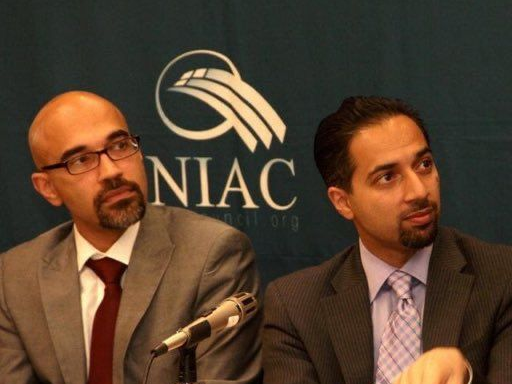
The director of the Swedish Institute for International Policy has been linked to a Tehran-directed influence network, according to a Swedish TV investigation relying on emails provided by Iran International.
The Swedish TV channel, TV4 Nyheterna, reported on Tuesday that Rouzbeh Parsi, the head of the Middle East program at the Swedish Institute of International Affairs (UI), communicated with authorities in Tehran who actively sought to amplify official Iranian foreign policy talking points in Western policy circles.
The discussions, TV4 reported, aimed to shape Western perceptions of Iran during critical nuclear negotiations.
TV4 said Parsi had held meetings with Iranian diplomats, including former Foreign Minister Javad Zarif, and worked alongside senior figures who were closely affiliated with the IRGC.
In 2023, a joint investigative report by Iran International and Semafor combed through thousands of emails from Iranian diplomats, revealing a network of academics and think tank analysts cultivated by Iran's foreign ministry to extend Tehran's soft power.
Members of the grouping, called the Iran Experts Initiative (IEI), were guided by Iran's Foreign Ministry in their public writing and media appearances. They were key voices in Western think tanks and policy institutions helping promote Iran's stances.
Parsi, listed in the leaked emails as an IEI member, attended its inaugural meeting in May 2014 at Vienna’s Palais Coburg hotel, coinciding with nuclear talks. Documents indicate that Iran’s foreign ministry covered the event’s costs.
While Parsi acknowledges his participation, he denies collaborating with Tehran.
“My purpose was to observe how Iranian officials reason and act in real-time,” he told TV4.
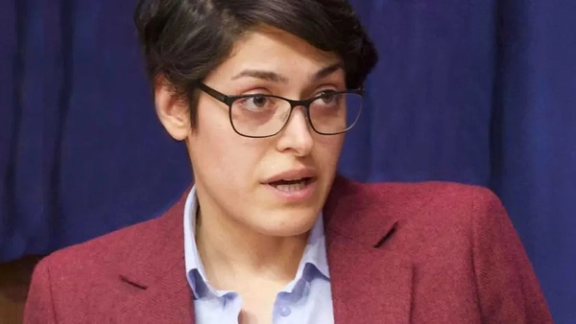
The leaked emails revealed that IEI members, including prominent Iranian-American scholars like Ali Vaez and Ariane Tabatabai, published articles supporting official Iranian positions.
In a 2015 email to Iranian officials, Khatibzadeh, a senior Iranian diplomat who helped mastermind the IEI, referred to participants as “our friends” and shared links to their work which aligned with Iran’s narrative on nuclear negotiations.
Khatibzadeh was appointed on Saturday as the head of the foreign ministry's think tank, the Institute for Political and International Studies (IPIS).
The IEI’s activities have drawn scrutiny, particularly regarding figures like Tabatabai, who held senior positions within the US Department of Defense.

President Donald Trump’s executive order last Monday to freeze all foreign aid funding has split US senators, some of whom see a welcome return to fiscal discipline and others see a threat to critical foreign policy priorities.
Human rights activists have in recent days expressed concern about the impact of the 90-day pause in foreign aid on Iran-related programs, with some saying the order could help Tehran further restrict its people’s access to information.
It has been more than two decades that the United States has been supported civil society and human rights in Iran on everything from documenting abuses by the country's rulers - Washington's Mideast arch enemy - to supporting efforts to transcend official internet censorship there.
Following Trump's executive order, Secretary of State Marco Rubio issued a directive to US embassies worldwide to halt all financial disbursements, except for critical emergency food programs including efforts to combat a widening famine in Sudan.
The audit aims to gauge the efficiency of foreign aid programs and their alignment with Trump's America First policy stance.
"We are merely looking at parts of the big bureaucracy where it has been tremendous waste and fraud and abuse," Trump said on Wednesday.
Outside the Senate floor, where an unprecedented number of reporters gathered in what many are dubbing the Trump effect amid intense interest in his barrage of early policy moves, lawmakers shared both support and scorn for the policy.
Senator John Fetterman set a light-hearted tone with reporters, saying Trump may not ultimately achieve all he wants. “I wish with an executive order I could get a beautiful head of hair,” in a nod to his signature bald look.
On a more serious note, the maverick Pennsylvania Democrat who has cultivated a working-class persona and has been more amenable to Republican policies than most of his peers, acknowledged concerns but took a measured approach.
“This is what (Trump) was running on. Obviously, there are things about this we need to be concerned about, but I’m not gonna freak out—and I know those freak-outs are gonna keep you guys in business,” he told congressional reporters.
Senator Mark Kelly, an Arizona Democrat known for his outspoken criticism of Trump, slammed the executive order.
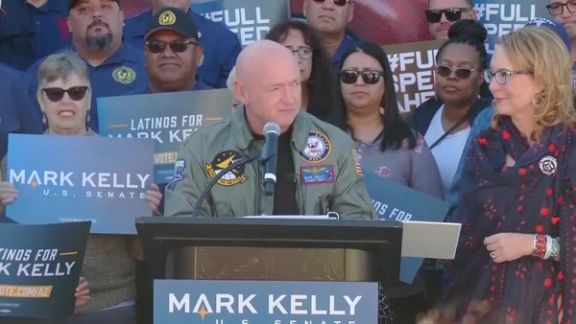
“This is a power grab. This is trying to take away our lawful authority to appropriate money and put it into the White House. I think this is trying to take power from one branch of the government and put it into the Oval Office,” Kelly said.
Senators Ted Cruz and Josh Hawley, both closely aligned with Trump, expressed full support for the funding pause. Cruz described the move as necessary to review what he called “politicized and misguided spending” under the Joe Biden administration.
“I think it’s perfectly reasonable for the incoming administration to assess where the money is going," Cruz, a Texas Republican, said. "I put out a report from the Commerce Committee on extreme DEI and politicized funding at the National Science Foundation—woke grants that abuse statutory intent. I’m glad the Trump administration is examining the money before it goes out the door.”
Hawley, a Missouri Republican, expressed faith in Rubio’s pending review. “What Secretary Rubio is doing will allow him a top-to-bottom review of the fundings and what he wants to do with them. I look forward to seeing what Rubio finds. I think he’ll come forward with recommendations."
The funding freeze sending shockwaves beyond Capitol Hill. A senior manager from a nonprofit organization impacted by the freeze who requested anonymity due to internal media restrictions, expressed deep concerns.
“All programs are suspended. It will get people killed and networks exposed,” the manager said, referring to Iran-related initiatives previously funded by the State Department’s Near Eastern Affairs office, which allocated nearly $60 million annually to such projects.
As the 90-day review period unfolds, the political and humanitarian fallout of the freeze will continue to be closely watched, with Rubio’s findings and recommendations likely to shape future debates.
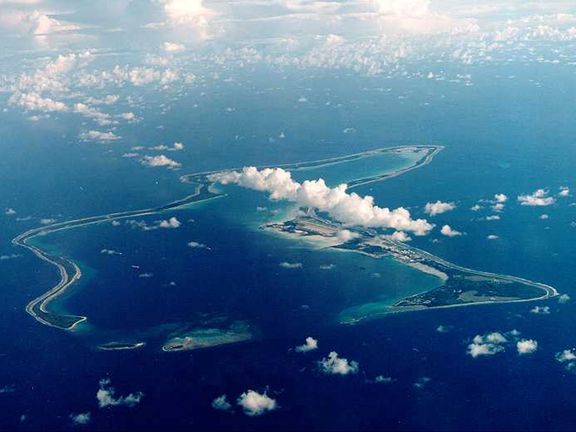
Mauritius urged the United States to finalize a deal ceding sovereignty over the Chagos Islands, vowing not to let any third party overrun the Indian Ocean territory - in a likely reference to Western adversaries Iran and China.
"If we manage to reach a deal, that will help us secure the base and prevent a third party from entering the base," said Dhananjay Ramful, the foreign minister of the African island country in the Indian Ocean.
"That would be in the interest of the US, UK and Mauritius.”
Ramful made the comments after Mauritian President Dharam Gokhool said in a speech on Monday that the country was still pushing to restore sovereignty over the archipelago that includes Diego Garcia, which houses a key US nuclear airbase.
Under the proposed agreement, the UK would cede control of the Chagos Islands to Mauritius. The remote strategic archipelago includes Diego Garcia, which Britain would then lease back for 100 years at a cost of £9 billion.
In an opinion piece for the right-leaning UK newspaper the Telegraph, Louisiana Republican Senator John Kennedy warned against what he called giving away the Chagos Islands, saying Mauritius was vulnerable to the influence of hostile powers.
“If Mauritius is growing its friendships with China and Iran, how can we expect it to keep our adversaries’ spies away from our base?” Kennedy wrote.
“It’s hard to believe that China and Iran aren’t trying to pull Mauritius into their axis and away from the West.”
While Mauritius's prime minister recently called for closer ties with Beijing, Ramful dismissed suggestions the deal would benefit China, noting, "We are the only African country that has refused to sign the Belt and Road initiative with China."
The Belt and Road Initiative (BRI), also called the New Silk Road, is China's global infrastructure strategy launched in 2013 to invest in over 150 countries and organizations.
Ramful said inking a deal on the future of the base benefits Washington.
"It is in the interest of the US to secure this base. And how do we secure this base? It’s by coming to an agreement that contains all the terms and conditions for the base to be operated by the US without interference from anybody.”
The Telegraph reported earlier this week that top Republicans are urging US President Donald Trump to block UK Prime Minister Sir Keir Starmer’s Chagos Islands deal, fearing it could facilitate Iranian espionage on US military operations.
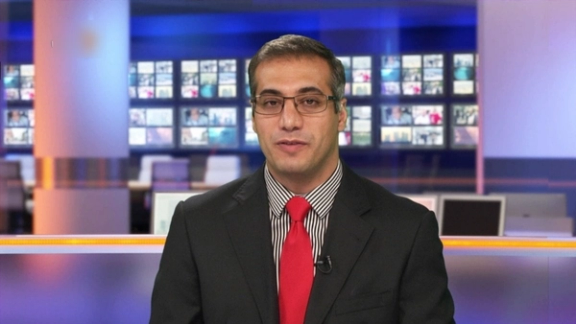
An Iranian court of appeals has upheld the 10-year prison sentence for Iranian-American journalist Reza Valizadeh, a former employee of a US government-funded broadcaster, his lawyer announced on X.
Mohammad-Hossein Aghasi said Wednesday he informed Valizadeh of the court's widely expected decision to uphold the 10-year prison sentence during a prison visit, but "perhaps a retrial could open the blindfolded eyes of justice."
The sentence relates to charges of so-called collaboration with a hostile government.
Valizadeh worked for Radio Free Europe/Radio Liberty's Persian Service, known as Radio Farda, for 10 years before leaving the organization in November 2022.
After 14 years abroad he returned to Iran to visit his family in March, according to a post he made on X. He was later arrested in September and received the 10-year jail term.
Radio Farda reported after his arrest that people close to Valizadeh believe he walked into a "security trap" despite the assurances of authorities he would face no punishment.
"Ten years in prison cannot be the punishment for working in the media, even if it is opposition media," Valizadeh's lawyer tweeted. "The charge of propaganda against the Islamic Republic carries a maximum sentence of one year in prison."
He was arrested, sources cited by Voice of America said, for refusing to cooperate with the IRGC Intelligence Protection and the Ministry of Intelligence as well as for declining to express remorse for his journalistic work.
Valizadeh remains in Ward 209 of Evin Prison, a section run by the Ministry of Intelligence where he lacks access to basic amenities and visitation rights, according to Human Rights Activists News Agency (HRANA).
International organizations, including Reporters Without Borders and the Committee to Protect Journalists, have criticized Valizadeh’s detention and demanded his release.
The US State Department called his arrest unjust and described it as a violation of international law in December.
However, Valizadeh has in recent weeks criticized the Biden administration's State Department for its "lack of effective action" regarding his situation.
In a phone message from Evin Prison shared with Iran International, he said that after the Biden State Department issued a statement saying his arrest and conviction by the Islamic Republic was unlawful, it took no effective measures to win his release.